 Petzlover
Petzlover Catalan Sheepdog is originated from Spain but Pudelpointer is originated from Germany. Catalan Sheepdog may grow 13 cm / 5 inches shorter than Pudelpointer. Both Catalan Sheepdog and Pudelpointer are having almost same weight. Both Catalan Sheepdog and Pudelpointer has same life span. Both Catalan Sheepdog and Pudelpointer has almost same litter size. Catalan Sheepdog requires Moderate Maintenance. But Pudelpointer requires Low Maintenance
Catalan Sheepdog is originated from Spain but Pudelpointer is originated from Germany. Catalan Sheepdog may grow 13 cm / 5 inches shorter than Pudelpointer. Both Catalan Sheepdog and Pudelpointer are having almost same weight. Both Catalan Sheepdog and Pudelpointer has same life span. Both Catalan Sheepdog and Pudelpointer has almost same litter size. Catalan Sheepdog requires Moderate Maintenance. But Pudelpointer requires Low Maintenance
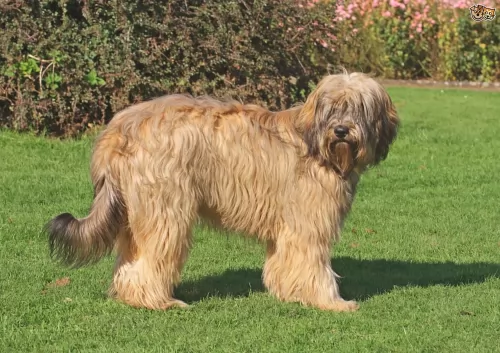 The Catalan Sheepdog, known also as the Gos d’Atura, hails from Catalonia, Spain. It is believed that the dog is related to the Portuguese- and Pyrenean Sheepdogs.
The Catalan Sheepdog, known also as the Gos d’Atura, hails from Catalonia, Spain. It is believed that the dog is related to the Portuguese- and Pyrenean Sheepdogs.
The standard for this breed was formulated in 1929. The sheepdog developed during Roman Empire times between 200 and 100 BC already, being used as livestock guard dogs. With the breed dwindling in the 1970s, Catalonian Sheepdog lovers started promoting it, but it remains a rare breed.
 The Pudelpointer is cross between the Poodle and the English Pointer. The first Pudelpointer was bred in 1881 by Baron Von Zedlitz in Germany.
The Pudelpointer is cross between the Poodle and the English Pointer. The first Pudelpointer was bred in 1881 by Baron Von Zedlitz in Germany.
The idea was to bring about a gun dog highly skilled in tracking and retrieving. The Pudelpointer was introduced to North America in 1956, and in 1977 the Pudelpointer Club of North America was established.
Because breeders have avoided recognition by the American Kennel Club, the Pudelpointer never became a well known breed in the United States.
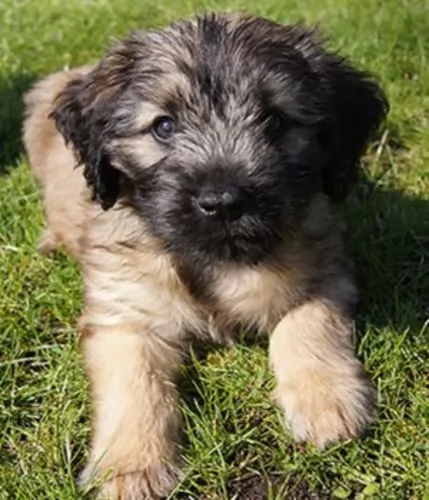 The Catalan is a medium sized dog but gives the impression of being bigger than he actually is. He stands from 45 – 55cm in height and weighs between 20 to 25kg.
The Catalan is a medium sized dog but gives the impression of being bigger than he actually is. He stands from 45 – 55cm in height and weighs between 20 to 25kg.
This breed also has double dew claws on the hind feet. He has a long coat which is slightly wavy and available in different shades such as fawn to brownish to dark grey to black. He has floppy, feathery ears and a fairly long, feathery tail. He has quite a bit of hair on he face too, so you’ll notice a beard, moustache as well as hair which covers the eyes somewhat.
Brave and courageous, the Catalan Sheepdog is also intelligent, active and hardy. He has a round face with a friendly, amicable expression. He is totally pleasant and sweet natured. However, in his role as guardian of sheep he took his role seriously, forming a strong relationship with both shepherd and sheep.
He is wary of strangers. Early socialization and training is always important, and while he makes a wonderful family pet, this training and socialization makes him more relaxed and obedient and he gets on well with children in the home as well as with other pets. While he is a placid, docile and gentle pet, he is also looked upon as a protector, and will defend his family.
 The Pudelpointer stands at between 55 and 68cm in height and weighs between 20 and 30kg. He is a medium sized dog with a weather resistant, double-layered coat. The coat doesn’t shed much and is usually a brown, chestnut, liver or black color.
The Pudelpointer stands at between 55 and 68cm in height and weighs between 20 and 30kg. He is a medium sized dog with a weather resistant, double-layered coat. The coat doesn’t shed much and is usually a brown, chestnut, liver or black color.
The coat is usually dense, harsh and wiry. They have floppy ears with quite a unique feature - the mustache on the muzzle. The tail is docked, with about 30% being removed, giving the dog an attractive, distinctive look.
Full of energy, the lively Pudelpointer will love to find himself in a family where they are active, outdoorsy types. He loves water too, and when out on a hike, if there’s water around, he’ll be the first to jump right in.
He’s an intelligent dog too, eager to please and ready to learn. He can easily be trained and socialized. He is loyal, calm and loving and will get on well around children and other animals in the home. He is also protective and makes a good watchdog.
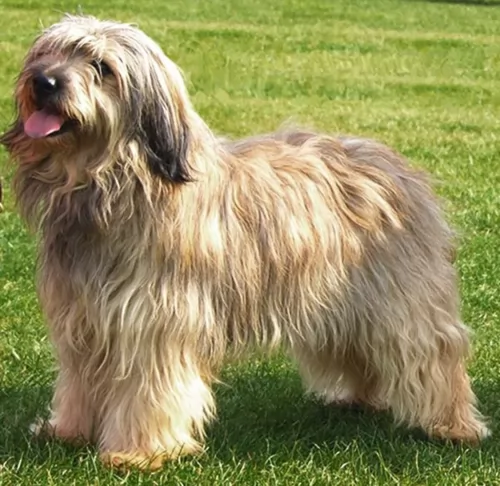 The Catalan Sheepdog is such an amicable character – he is going to make an awesome pet. He is an intelligent and obedient dog and is easily trained.
The Catalan Sheepdog is such an amicable character – he is going to make an awesome pet. He is an intelligent and obedient dog and is easily trained.
He has been used for guarding- and herding work and as a family pet makes a excellent guard dog as well. Capable of being gentle too, he is everything his human family wants him to be and just becomes a regular member of the family.
 The Pudelpointer may well be a gun dog but when it comes to his human family he is a social, loving companion.
The Pudelpointer may well be a gun dog but when it comes to his human family he is a social, loving companion.
He is intelligent too and can be easily trained. When at home with his human family, he is calm and content. He will however need lots of exercise and mental stimulation. In exchange for your love and care, he will be a good watchdog, protector, pet and friend.
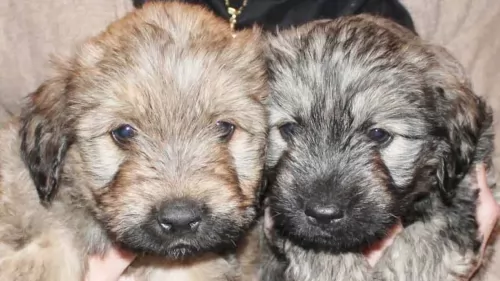 The Catalan Sheepdog is a fairly healthy breed and has a life expectancy of 12, 13 or 14 years. Nonetheless you will still need to watch out with common dog ailments with him, particularly hip dysplasia.
The Catalan Sheepdog is a fairly healthy breed and has a life expectancy of 12, 13 or 14 years. Nonetheless you will still need to watch out with common dog ailments with him, particularly hip dysplasia.
This is a joint and hip disease which can start with symptoms from 6 months of age already. Your dog will be hesitant to play and jump, doesn’t like to go upstairs, tires easily during a walk and develops a hop-like way to walk. You’ll notice that when he lies down, he battles to- or is reluctant to get up again.
X-rays may be required to confirm the diagnosis of hip dysplasia. There are different treatment options, all with the wellbeing of your pet in mind. You don’t want him to have a life of pain and lameness.
 The Pudelpointer is active and healthy and can live up to 14 years and maybe even longer with good care.
The Pudelpointer is active and healthy and can live up to 14 years and maybe even longer with good care.
Owners will do well to know about a couple of the common dog illnesses that can strike at any time -
Some dogs are more at risk for bloating. Larger dogs with deep chests are at greater risk. To help with preventing this deadly ailment, feed your dog a couple of smaller meals a day instead of one big meal that he gobbles up quickly.
Bloat is a medical condition which comes about with a rapid accumulation of gas in the stomach. Canine bloat or gastric dilatation and volvulus is a killer disease. The accumulation of gas can cause the stomach to twist and the dog can go into shock.
Your dog will be trying to vomit, he’ll be panting and pacing, drooling with a hard, swollen stomach.
This is a common illness or condition seen in many dogs, young and old, large and small.It’s a disease which can lead to pain, arthritis and lameness.
The Pudelpointer has floppy ears and loves swimming. The floppy ears are at risk for developing ear infections. Check inside the ears that they aren’t red or have a discharge. Your dog will be scratching his ears a lot.
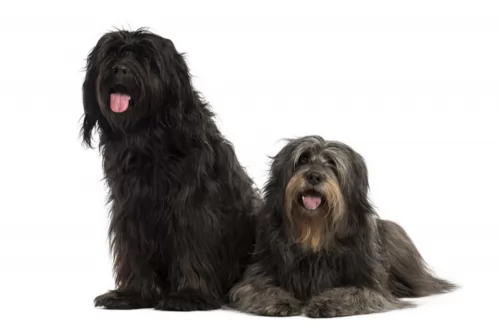 The Catalan Sheepdog is a working breed, so he is going to need plenty of exercise. While he adapts easily to city- or country life, it will be to his benefit to have a garden to romp in. You will still need to take him for walks and play ball- and rope games with him. This will prevent boredom and destructive behavior from him.
The Catalan Sheepdog is a working breed, so he is going to need plenty of exercise. While he adapts easily to city- or country life, it will be to his benefit to have a garden to romp in. You will still need to take him for walks and play ball- and rope games with him. This will prevent boredom and destructive behavior from him.
The Catalan Sheepdog has long hair so he will need to be brushed twice a week to avoid matting. This will help to remove loose hair too, but also distribute natural oils through his coat, keeping his hair and skin healthy and free from skin rashes and itchiness.
This brushing ensures other benefits as you can simultaneously check him for parasites such as fleas and ticks.
If you feed him commercial dog food, make sure its a high quality one. He is an active breed so will require high protein. Give him some homemade rice, vegetables and meat, and include raw meat in his food from time to time too. Always ensure that there is fresh, cool water constantly within reach.
 Brush your PudelPointer twice a week to get rid of loose hairs.
Brush your PudelPointer twice a week to get rid of loose hairs.
Grooming can be an awesome bonding experience for you and your dog. While you’re brushing him, check him over for any unusual lumps.
Trim the nails if they don’t wear down naturally themselves.
Check inside the mouth for rotting teeth which can be a source of pain and lot of diseases in the body.
Exercise is very important and can come in the form of a walk every day or hikes, swimming as well as ball- and rope games and hide-and-seek.
Provide your dog with a nice warm, comfortable place to sleep.
Your PudelPointer can get to 14 years of age with good food. While you do get some excellent commercially manufactured dog foods, you want to be sure your pet gets some nutritious home-made food too.
Make sure that the kibble is the high quality ones with lots of vitamins and minerals. Boiled chicken, brown rice or pasta and spinach, sweet potatoes and carrots are a healthy choice for your pet – plain and simply just like dogs love it. Chop it up and add it into the dry kibble a couple of times a week.
Some raw meat added in from time to time will help his skin and coat remain healthy. Never leave him without a constant source of fresh, cool water.